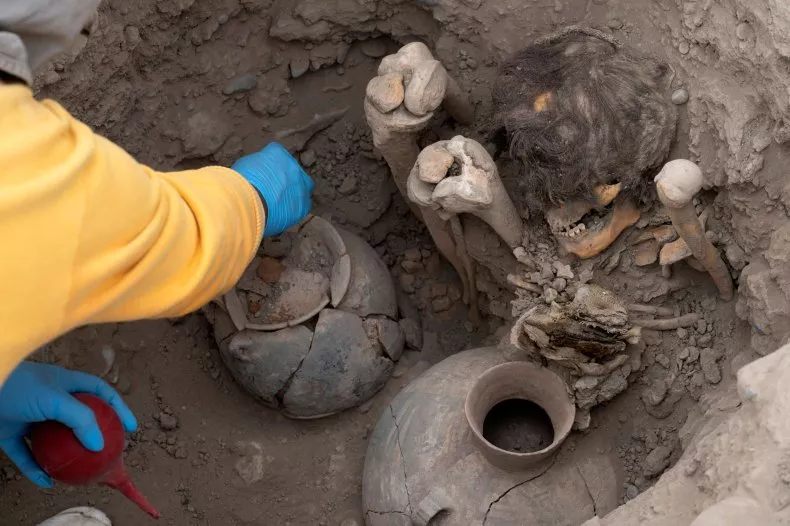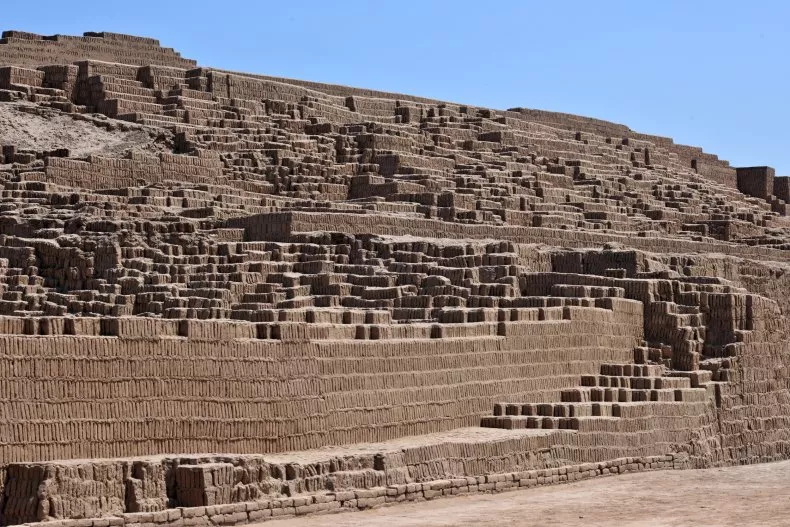
A mummy belonging to the pre-Inca Ychsma culture was found buried at the Huaca Pucllana site in Lima, Peru.
Newspaper Per 21 stated that during excavations at the Huaca Pucllana archaeological site, researchers came across a mummy that belongs to the pre-Incan Ychsma civilisation.
At the summit of the pyramid, which is situated in the center of a residential neighborhood in the Peruvian capital of Lima, the body was interred in a straightforward, circular tomb. The Huaca Pucllana is a sizable clay pyramid in the city’s Miraflores neighborhood that is more than 70 feet tall.
The Lima culture, which emerged on the central coast of Peru between A.D. 200 and 700, built the monument, which has seven staggered platforms.
The location was a significant ceremonial hub for these prehistoric people. The evidence points to the site’s primary use as a location for ceremonial events, though other activity, possibly administrative, may have taken place there.
Before Spanish colonialism, the location was occupied for three distinct time periods. Huaca Pucllana was initially inhabited by the Lima culture, a civilization that flourished between A.D. 400 and 700 and built it.
The Huari civilisation followed, occupying the location between A.D. 800 and 900.
Last but not least, Huaca Pucllana has been the site of Ychsma habitation since the beginning of the second millennium. This was the location’s final pre-Hispanic habitation.

The Huaca Pucllana pyramid in Lima, Peru, features seven staggered platforms.
Huaca Pucllana appears to have been utilized as a burial site by the Ychsma culture, which flourished in the area around A.D. 1000 before being incorporated into the Inca Empire in the 15th century.
Archaeologists last year discovered a personal tomb with human remains at the summit of the pyramid connected to the Ychsma culture as a result of investigations. The Huaca Pucllana site museum said in a statement that a portion of the building had to be dismantled in order to make room for the tomb.
The person was discovered by archaeologists inside the tomb, facing south and flexed in a sitting position.
The body was covered in a plain fabric, of which only a few fragments have survived. In addition, the cemetery contained a number of other items, such as pottery vessels, which allowed researchers to place the burial into the early Ychsma civilization.
At the Huaca Pucllana location, mummies and ancient offerings have already been discovered. However, no Ychsma burial objects previously unearthed at the location have the kind of adornment present on those in the recently discovered grave.
Mirella Ganoza, an archaeologist with the Huaca Pucllana Site Museum, told Per 21: “I find it quite interesting that right in the heart of Miraflores, in the middle of the city, surrounded by modern buildings and constructions, an important site such as the Huaca Pucllana ceremonial center is still preserved.”